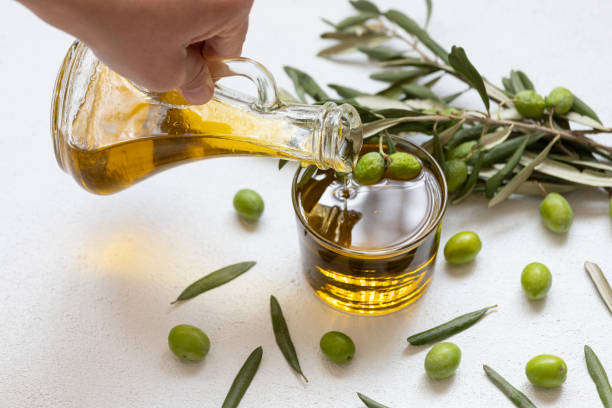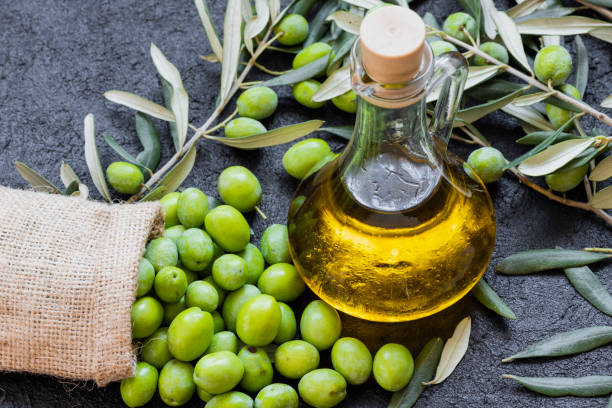Expert Opinion
Dietician – Dietetics and Clinical Nutrition Services · 7 years of experience · South Africa
No, olive oil should not be consumed beyond 2 years, ideally not past 18 months. By this time, the oil would likely have turned rancid. To preserve olive oil, store it in a cool, dark place, but even under these conditions, it should not be used after the 2-year mark.
Expert Opinion
Yes, olive oil is abundant in beneficial fats, aiding in cholesterol regulation. It contains vital antioxidants that bolster immunity and cardiovascular health, enhances satiety, improves digestion, acts as a natural anti-inflammatory, and supports bone health due to its calcium and vitamin K content.
Expert Opinion
Olive oil typically remains good for 18 to 24 months from bottling, while extra virgin varieties may have a shorter shelf life of 12 to 18 months. Beyond this period, the oil will likely go rancid.
Olive oil is associated with numerous health advantages, including its antioxidant, healthy fat, and anti-inflammatory properties. The effects of dietary fats are often debated, but there is consensus among experts that olive oil—especially extra virgin—offers significant health benefits.
Here are 11 scientifically supported health benefits of olive oil:

- Olive Oil Is Rich in Healthy Monounsaturated Fats
Olive oil, derived from olives, is naturally rich in monounsaturated fats, particularly oleic acid, which makes up 71% of its fat content. This fatty acid is known for reducing inflammation and oxidative stress and may even have beneficial effects on genes associated with cancer. Additionally, monounsaturated fats are resistant to high temperatures, making extra virgin olive oil an excellent choice for cooking. - Olive Oil Contains Significant Antioxidants
Extra virgin olive oil is a modest source of vitamins, with 1 tablespoon providing 13% of the Daily Value (DV) for vitamin E and 7% for vitamin K. It is also packed with powerful, biologically active antioxidants that may help lower the risk of chronic diseases affecting the cardiovascular and central nervous systems. These antioxidants combat inflammation and protect blood cholesterol from oxidation, potentially reducing the risk of heart disease. - Olive Oil Possesses Strong Anti-Inflammatory Properties
Chronic inflammation is a major driver of diseases such as cancer, heart disease, metabolic syndrome, type 2 diabetes, Alzheimer’s, arthritis, and obesity. Extra virgin olive oil may help mitigate inflammation, a primary reason for its health benefits. The antioxidants, particularly oleocanthal, mimic the effects of ibuprofen, a common anti-inflammatory drug. Moreover, oleic acid, the main fatty acid in olive oil, can lower levels of inflammatory markers like C-reactive protein (CRP). - Olive Oil May Help Prevent Strokes
A stroke occurs when blood flow to the brain is disrupted, either by a clot or bleeding. It is the second leading cause of death globally. While studies have shown mixed results, some research suggests that olive oil is the only monounsaturated fat source associated with a reduced risk of stroke and heart disease. However, other studies indicate no significant link between olive oil consumption and stroke risk. - Olive Oil Is Protective Against Heart Disease
Heart disease remains the leading cause of death worldwide. Observational studies have shown that heart disease is less prevalent in Mediterranean countries, leading to research on the Mediterranean diet. This diet, which includes extra virgin olive oil as a key ingredient, has been shown to significantly reduce heart disease risk. Although the research on olive oil’s specific benefits for heart disease is mixed, it has been shown to lower inflammation, increase HDL (good) cholesterol, and reduce blood pressure, a major risk factor for heart disease. - Olive Oil Is Not Associated with Weight Gain and Obesity
While excessive calorie intake can lead to weight gain, fats are particularly calorie-dense. However, numerous studies have linked the Mediterranean diet, rich in olive oil, with favorable effects on body weight. In fact, diets high in olive oil have been shown to promote weight loss more effectively than diets low in olive oil. Nevertheless, consuming too much of any food, including olive oil, can contribute to weight gain. - Olive Oil May Combat Alzheimer’s Disease
Alzheimer’s disease is a common neurodegenerative condition characterized by the accumulation of beta-amyloid plaques in the brain, leading to cognitive decline and memory loss. Some studies suggest that olive oil may reduce the risk of developing Alzheimer’s disease by decreasing beta-amyloid plaques, neuroinflammation, and oxidative stress. However, more research is needed to fully understand olive oil’s impact on Alzheimer’s disease. - Olive Oil May Lower the Risk of Type 2 Diabetes
Olive oil may help protect against type 2 diabetes. Research has shown that people with prediabetes who consumed oleanolic acid-enriched olive oil daily were significantly less likely to develop diabetes. Additionally, olive oil supplementation has been found to reduce blood sugar levels and fasting plasma glucose in people with type 2 diabetes. - Olive Oil’s Antioxidants Have Anticancer Properties
Cancer is one of the leading causes of death worldwide. The lower cancer risk observed in Mediterranean countries is believed to be partially due to the Mediterranean diet, which includes olive oil. Antioxidants in olive oil may help reduce oxidative damage caused by free radicals, a leading factor in cancer development. However, more research is needed to clarify olive oil’s exact role in cancer prevention. - Olive Oil Can Help Treat Rheumatoid Arthritis
Rheumatoid arthritis is an autoimmune disease characterized by painful, deformed joints. Although the cause is not fully understood, it involves the immune system attacking healthy cells. Olive oil has been linked to lower inflammatory markers and disease severity in people with rheumatoid arthritis. However, limited research supports olive oil’s effects on rheumatoid arthritis, and healthcare professionals may recommend other natural remedies as part of a treatment plan. - Olive Oil Has Antibacterial Properties
Olive oil contains compounds that may inhibit or kill harmful bacteria, including Helicobacter pylori (H. pylori), a bacterium that can cause stomach ulcers and stomach cancer. Some studies suggest that extra virgin olive oil may help fight against certain strains of this bacterium, but more research on humans is needed to confirm these findings.
Make Sure to Get Extra Virgin Olive Oil
Purchasing extra virgin olive oil may offer more health benefits than refined olive oil, as it retains more of the antioxidants and bioactive compounds found in olives. When buying olive oil, read labels and ingredient lists carefully, as some oils “extra virgin” may be diluted with refined oils. Look for the North American Olive Oil Association seal of approval to ensure quality.
ALSO READ : Bennifer and Brangelina’s Hollywood marriages fail due to clashes of egos and struggles for dominance
Frequently Asked Questions
- Is a spoonful of olive oil a day good for you?
Research suggests that consuming as little as 1/2 tablespoon of olive oil daily may reduce the risk of cardiovascular and heart diseases. - What are the benefits of olive oil?
Olive oil provides healthy fats, antioxidants, and anti-inflammatory properties that may help prevent chronic diseases. - How much olive oil should you consume daily?
There is no specific recommendation, but consuming at least 1/2 tablespoon daily is associated with a lower risk of some chronic diseases.



